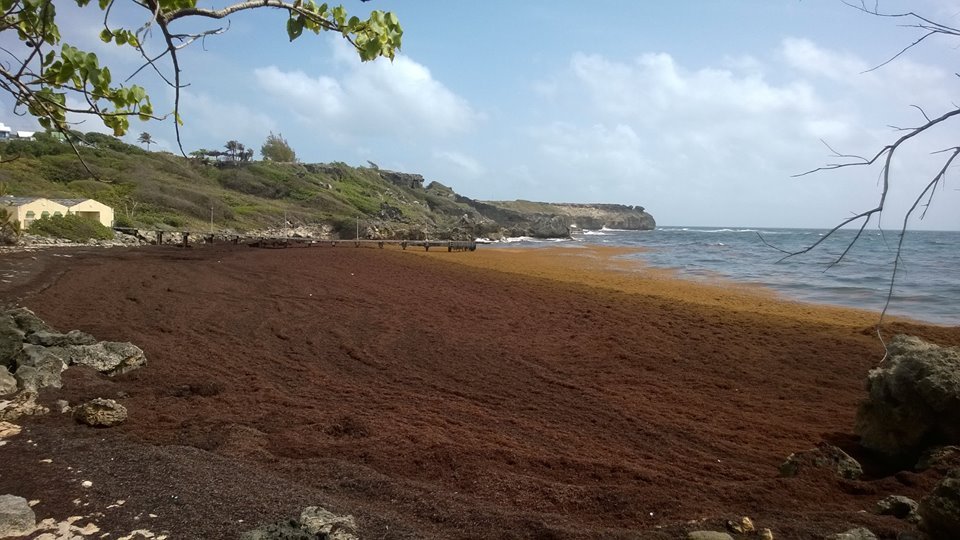Seaweed-Eating Crabs Could Help Save Coral Reef
The Caribean's largest herbavoirous crab, Maguimithrax spinosissimus. Source: James St. John and provided by Miranda Manross Flickr
Sounds of munching seaweed in the waters of Florida Keys aren’t coming from humans eating a classic sushi roll, but rather from the Caribbean’s largest herbivorous crab. Researchers Angelo Spadaro and Mark Butler at the Florida International University discovered these crabs as a way to reduce the abundant seaweed production in the marine ecosystem published in Current Biology.
“On Caribbean coral reefs, the explosion of seaweeds is caused by coastal eutrophication and the loss of grazers,” the researchers said in their paper. “The most dramatic example being the near extirpation of the long-spined sea urchin (Diadema antillarum) in the early 1980s, a catastrophe caused by an unknown pathogen.”
Overproduction of seaweed can inhibit the growth of plants and organisms in the marine ecosystem, specifically for reefs. Spadaro and Butler found the “powerful grazing capability” of the Maguimithrax spinosissimus, otherwise known as the Caribbean’s largest herbivorous crab.
“This species consumes seaweeds at rates that exceed nearly all other fish or invertebrate grazers in the Caribbean; they even eat chemically and physically defended algae (e.g., Halimeda spp.) that other grazers avoid,” they wrote.
While its overwhelming presence in the Keys seems harmful to coral reefs, seaweed has its beneficial contributions. Seaweed can absorb the excess carbon and nitrogen in the water to decrease the ocean’s acidity that contributes to the oceanic balance for organisms and places.
However, too much seaweed poses a problem for the marine ecology, but too little threatens the food chain.
Known as a primary producer in the food chain, seaweed is the food for many primary consumers that depend on it for food and shelter.
The sunny islands of Florida Keys house the third longest coral reef in the world and now the coral coverage is less than it was before.
“We've lost 90% of our coral cover in recent decades," Erinn Muller, Coral Biologist at the Mote Marine Laboratory in Sarasota, Florida told Science.
Without coral reefs, the ocean ecosystem would struggle to sustain itself and maintain a prosperous climate for other plants and animals. Coral reefs are the structural foundation for protecting the oceans from intense currents and being a home for small organisms.
The reefs in the Florida Keys have “become a coral reef without corals,” Spadaro and Butler said.
Particularly focused on helping coral reefs in the Keys, Butler and Spadaro think their algae-eating crabs can be an optimistic approach to saving these reefs and others alike.
“Our findings demonstrate that large-scale restoration that includes enhancement of invertebrate herbivores can reverse the ecological phase shift on coral reefs away from seaweed dominance,” they said.
As these Caribbean crabs have awakened a possible solution to the aggressive seaweed issue; their minute population constitutes another. If these crabs are to be used on a larger scale, the researchers believe mariculture programs, marine farming, will need to be created.
Granted, seaweed overgrowth is not the only reason for this massive decline in coral, but it displays the complex interconnections in the oceans.
The efforts made by Spadaro and Butler to foster new and remaining coral life are optimistic, but only temporary. Climate change is hammering these reefs negatively that can cause a major disaster for the ocean ecosystem. "By 2100, it's looking quite grim,” Renee Settler, a researcher at the University of Hawaii Manoa researchers, told the World Economic Forum.
“Still, given the complexity of the problems facing modern coral reefs, it is overly simplistic to think that transplantation of corals and herbivores alone will stem the worldwide decline of coral reefs,” Butler and Spadaro said. “Doing so also depends on reversing the overarching threats posed by ocean warming and acidification, coral diseases, and the adverse impacts of coastal pollution and overexploitation of coral reef fisheries.”
A heap of sargassum seaweed that drifted ashore. Source: Coastal Zone Management unit

